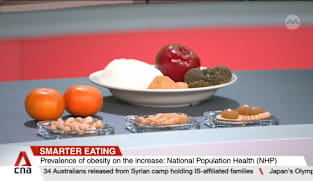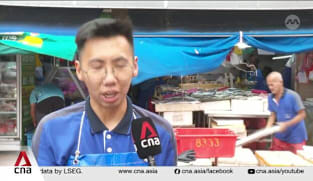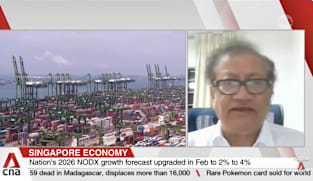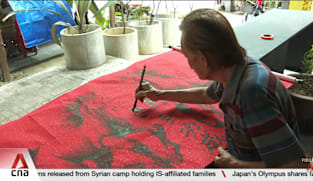Committee of Supply 2024 debate, Day 4: Maliki Osman on inclusive education for diverse learners
Singapore’s vision for an inclusive tomorrow starts with empowering its children to fulfil their potential, said Second Minister for Education Maliki Osman. “We want to meet the unique needs of our diverse learners and provide multiple pathways to support their aspirations. By bringing out the best in every student, we support the collective success of all Singaporeans,” he said in Parliament on Monday (Mar 4). To achieve this, the Ministry of Education (MOE) will continue to improve access to quality education. Firstly, it will provide a stronger start for children from lower-income families through MOE Kindergartens (MKs). Today, all 55 MKs offer KCare for parents who require full-day care services for their children. MOE raised the household income cap for priority admission from S$3,500 to S$4,500 last year. But preschool fees may still deter some lower-income families from enrolling their children in preschool, said Dr Maliki. Today, only the children of Singapore citizens with working mothers are eligible for the KCare Additional Subsidy (AS). MOE will extend the KCare AS to all families earning up to S$6,000 per month from the fourth quarter of this year, said Dr Maliki. This means all families with a gross monthly household income of up to S$6,000 will receive subsidies. Those with a gross monthly household income of S$3,000 and below will pay as low as three dollars a month for MK and KCare. Dr Maliki hopes this will further encourage preschool enrolment among lower-income families. Secondly, MOE will continue to support students who face difficulties in school due to challenges in their home settings through the Uplifting Pupils in Life and Inspiring Families Taskforce (UPLIFT). In 2023, UPLIFT supported about 16,500 students in around 300 schools. In 2020, it piloted the UPLIFT Community Network to coordinate support at the town level and connect families to resources. More than six in 10 students improved in attendance and seven in 10 parents showed improved parenting habits and parent-child relationships. Encouraged by this success, MOE expanded the network to more than 100 schools across all 24 towns nationwide in 2023. Thirdly, MOE will continue to enable students with Special Educational Needs (SEN) to fulfil their potential. About 28,500 SEN students, or 80 per cent, attend mainstream schools today and receive targeted help. Dr Maliki said the Government will do more for special education (SPED) schools. It has worked with nine higher-fee SPED schools serving students with Autism Spectrum Disorder and Multiple Disabilities to lower their fees by up to 60 per cent for Singapore citizens by mid-2025. With this, the maximum monthly fees for any Singapore citizen in SPED schools will be reduced from S$150 to S$90. More than 3,500 students and their families will benefit. Dr Maliki pointed out that about 50 per cent of all SPED students currently pay similar fees as students in mainstream schools. To support the SPED teaching force and enhance the attractiveness of the profession, MOE has reviewed SPED teachers’ and teacher aides’ (TAs) salary guidelines. Between 2024 and 2026, existing trained SPED classroom teachers can see salary enhancements of up to 12 per cent. From this year, starting salaries for these teachers will climb by up to 15 per cent and those of TAs by up to 17 per cent. Funding will be provided to social service agencies to implement them progressively. To strengthen SPED teachers’ capabilities, there will be more professional development programmes. A School Staff Developer will be appointed in each SPED school to enable professional growth in teachers. Dr Maliki also highlighted MOE’s support of the Singapore Green Plan 2030 to nurture stewards of the environment. Polytechnics and Institutes of Higher Learning will pilot a new sustainability initiative this year. Students from each institution will “adopt” three blocks near their campuses and engage residents through workshops and visits to reduce water and electricity consumption, as well as increase recycling and greening efforts.
Singapore’s vision for an inclusive tomorrow starts with empowering its children to fulfil their potential, said Second Minister for Education Maliki Osman. “We want to meet the unique needs of our diverse learners and provide multiple pathways to support their aspirations. By bringing out the best in every student, we support the collective success of all Singaporeans,” he said in Parliament on Monday (Mar 4). To achieve this, the Ministry of Education (MOE) will continue to improve access to quality education. Firstly, it will provide a stronger start for children from lower-income families through MOE Kindergartens (MKs). Today, all 55 MKs offer KCare for parents who require full-day care services for their children. MOE raised the household income cap for priority admission from S$3,500 to S$4,500 last year. But preschool fees may still deter some lower-income families from enrolling their children in preschool, said Dr Maliki. Today, only the children of Singapore citizens with working mothers are eligible for the KCare Additional Subsidy (AS). MOE will extend the KCare AS to all families earning up to S$6,000 per month from the fourth quarter of this year, said Dr Maliki. This means all families with a gross monthly household income of up to S$6,000 will receive subsidies. Those with a gross monthly household income of S$3,000 and below will pay as low as three dollars a month for MK and KCare. Dr Maliki hopes this will further encourage preschool enrolment among lower-income families. Secondly, MOE will continue to support students who face difficulties in school due to challenges in their home settings through the Uplifting Pupils in Life and Inspiring Families Taskforce (UPLIFT). In 2023, UPLIFT supported about 16,500 students in around 300 schools. In 2020, it piloted the UPLIFT Community Network to coordinate support at the town level and connect families to resources. More than six in 10 students improved in attendance and seven in 10 parents showed improved parenting habits and parent-child relationships. Encouraged by this success, MOE expanded the network to more than 100 schools across all 24 towns nationwide in 2023. Thirdly, MOE will continue to enable students with Special Educational Needs (SEN) to fulfil their potential. About 28,500 SEN students, or 80 per cent, attend mainstream schools today and receive targeted help. Dr Maliki said the Government will do more for special education (SPED) schools. It has worked with nine higher-fee SPED schools serving students with Autism Spectrum Disorder and Multiple Disabilities to lower their fees by up to 60 per cent for Singapore citizens by mid-2025. With this, the maximum monthly fees for any Singapore citizen in SPED schools will be reduced from S$150 to S$90. More than 3,500 students and their families will benefit. Dr Maliki pointed out that about 50 per cent of all SPED students currently pay similar fees as students in mainstream schools. To support the SPED teaching force and enhance the attractiveness of the profession, MOE has reviewed SPED teachers’ and teacher aides’ (TAs) salary guidelines. Between 2024 and 2026, existing trained SPED classroom teachers can see salary enhancements of up to 12 per cent. From this year, starting salaries for these teachers will climb by up to 15 per cent and those of TAs by up to 17 per cent. Funding will be provided to social service agencies to implement them progressively. To strengthen SPED teachers’ capabilities, there will be more professional development programmes. A School Staff Developer will be appointed in each SPED school to enable professional growth in teachers. Dr Maliki also highlighted MOE’s support of the Singapore Green Plan 2030 to nurture stewards of the environment. Polytechnics and Institutes of Higher Learning will pilot a new sustainability initiative this year. Students from each institution will “adopt” three blocks near their campuses and engage residents through workshops and visits to reduce water and electricity consumption, as well as increase recycling and greening efforts.



















